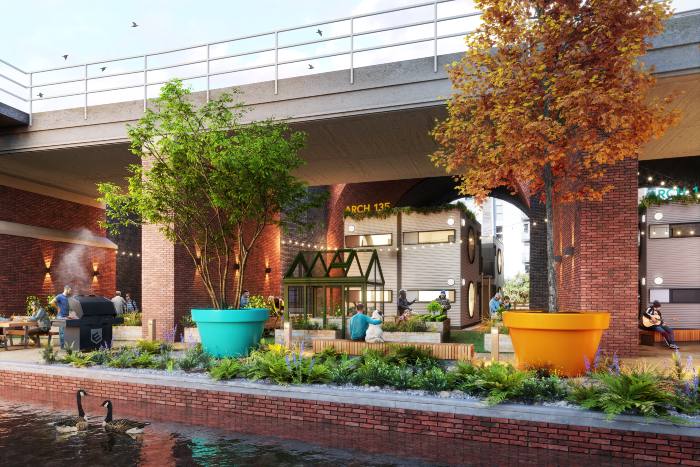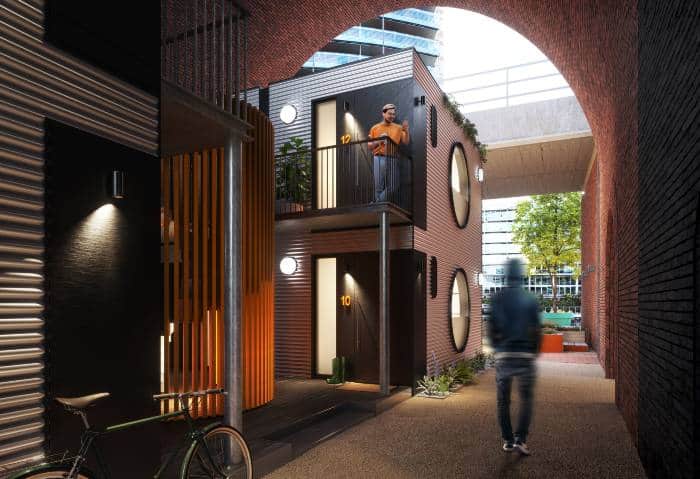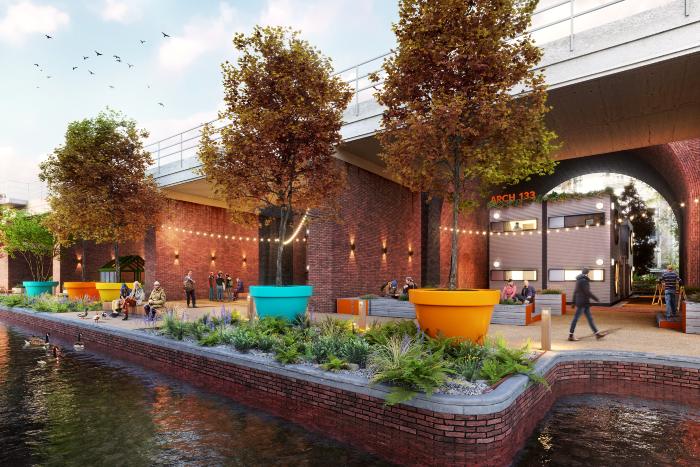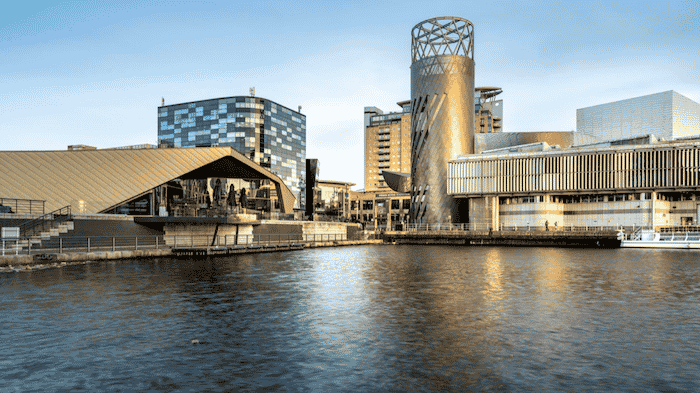‘Homeless village’ set to open in city centre railway arches
- Written by Ethan Davies
- Last updated 10 months ago
- Charity, Community, Featured, Property & Planning

A new ‘village’ for homeless people will be built in railway arches in Manchester city centre.
Embassy Village will provide space for 40 homeless people on St George’s Island in Castlefield. Some 40 studio homes are going to be built in the area, so each resident will have space to themselves.
The project was given planning permission three years ago, but bosses have been pulling funding together in the interim to make it a reality. Now, they have secured more than £3.5 million in donations, so work will get going on-site.

“Once open Embassy Village will provide homes, support and stability for people when they need it most,” explained Embassy Village’s Sid Williams.
“Our aim is for it to be a community where residents, with support, can rebuild their lives and break the cycle of homelessness that people so often get trapped in.
We’ve got a brilliant and busy few months ahead as our vision for Embassy Village becomes a reality and people can expect a flurry of activity this summer. We’ll soon be able to confirm the contractor we’ll be partnering with for the build and we are aiming to get going on site this summer.”
It’s hoped the scheme will be completed next year. Alongside the homes, there will be a village hall meeting area, green areas like a community ‘mini allotment’ and a sports area.
Although there is the cash to get the village off the ground, Embassy is now seeking more donations to pay for the long-term maintenance of the site.
Embassy charity
Embassy (Charity number: 1174728) ‘takes homeless people off the streets who have been assessed and referred by key workers and are committed and motivated to the challenge of getting back on track.’
The charity ‘provides them with a room in a shared property’ and ‘helps them to find a job, save funds and find permanent accommodation, with aftercare.’ They provide them with physical, mental and spiritual care with a Christian faith-based focus.

Husband and wife team Sid and Tess Williams launched the charity in 2019 and started by finding a second life for a luxury tour bus as an emergency shelter and support centre to help people get off the street, housed and into work.
“We give them the keys to the front door and they sign a tenancy agreement, so they are no longer homeless,” said Sid Williams, director of Embassy.
“They learn to shop, cook, and budget, and we work with 12 companies to get them into full-time work so that then they’re saving up to move on. By the time they leave us they’re actually not living on benefits and they’re in full time work.”
Embassy has used a converted tour bus to provide emergency shelter and support to up to 12 vulnerable adults at a time. The village would give the capacity to help up to three times as many.
The plans for Embassy Village will see about 40 containers placed under the redundant arches and provide 40 modular homes, a village hall and a communal green space.
Embassy teamed up with Greater Manchester Mayor’s Charity and local businesses to help turn the vision of Embassy Village into reality.
Capital & Centric
“There are not enough places for homeless people to go when it’s cold,” says Tim Heatley at Capital & Centric. “When we’re finished, there’s going to be one-bedroom apartments and pods with things like planted areas so they can grow their own food and a village hall where people can go, hang out, interact and learn new skills. Lots of people have stepped forward and said they’d love to help.”
The site which will become Embassy Village is currently owned by Peel L&P, which is working in conjunction with fellow developer Capital & Centric and the Greater Manchester Mayor’s Charity to deliver the scheme.
“If we can bring the business community together and help provide units to go into our arches here, a homeless person can have a home here and get back into society,” says James Whittaker of Peel L&P.
The planning application has been unanimously approved by the council, a decision welcomed by Embassy’s co-founder and director Sid Williams.
“It’s really heartwarming to see Manchester’s response being so positive,” continued Sid.
Potential residents will be interviewed and triaged, and only those who are ready and keen to work and improve themselves will be offered accommodation.
A strict zero-tolerance drug and alcohol policy will also be enforced by staff, who will live on the site and manage it around the clock.
Peel L&P
“It’s been a real joy and a privilege to bring together the business community to help create our vision to deliver a special project to reduce Manchester’s homelessness by transforming our land beneath some railway arches in the city into much-needed housing for the homeless,” said James Whittaker of Peel L&P.
“We’re delighted to partner with Embassy, a charity that will make a huge difference in helping vulnerable adults obtain better lives through their restoration programme by getting them into housing, employment and independent living.
“We’re proud to be able to provide the land for this Housing First Community and we would like to thank the generosity and support of everyone who has been involved in this project to bring this vision to fruition.
“We hope to gain further support needed at the public consultation.”
Manchester City Council
Meeting the growing demand for emergency accommodation to support people vulnerable to homelessness is a major challenge, says leader of Manchester City Council Sir Richard Leese, “particularly at this time of year when the number of people asking for support, particularly people sleeping rough, is at its height.
“Developing a Housing First opportunity in the city is welcome and I hope this type of community has the potential to provide life-changing help for people facing homelessness in Manchester.”

Plans for Embassy Village are being launched amidst the closure of dormitory-style shelters due to lockdown and social distancing measures, and growing concerns across frontline charities that there will be an increased need for homelessness support and temporary accommodation services as a result of the pandemic.
Government COVID-19 support measures, such as a ban on evictions and funding to house rough sleepers in hotels, are also due to end in the spring, heightening fears across the city’s charity sector that this could drive a spike in homelessness.
At the village, the charity’s team of resettlement workers and volunteers will provide wrap-around support of at least six hours per week per resident to equip them with a range of life skills including shopping & budgeting, cooking, and how to manage a home as well as a course designed to help residents unpack past traumas and grow in confidence.
The self-contained site will be managed 24/7 by Embassy’s experienced team.
Embassy’s training and mentoring programme is also being designed to boost residents’ work readiness through job application, interview support and wider training.
The charity plans to build on its successful track record of helping residents to resettle into secure long-term accommodation and find routes back into work by collaborating with local employers.
12 companies are already signed up to offer employment. Embassy would be glad to hear from more companies interested in partnering.
To take part in the consultation visit embassyvillage.co.uk and complete the online questionnaire. The consultation closes on 18th February 2021.
- This article was last updated 10 months ago.
- It was first published on 4 February 2021 and is subject to be updated from time to time. Please refresh or return to see the latest version.
Did we miss something? Let us know: press@ilovemanchester.com
Want to be the first to receive all the latest news stories, what’s on and events from the heart of Manchester? Sign up here.
Manchester is a successful city, but many people suffer. I Love Manchester helps raise awareness and funds to help improve the lives and prospects of people across Greater Manchester – and we can’t do it without your help. So please support us with what you can so we can continue to spread the love. Thank you in advance!
An email you’ll love. Subscribe to our newsletter to get the latest news stories delivered direct to your inbox.
Got a story worth sharing?
What’s the story? We are all ears when it comes to positive news and inspiring stories. You can send story ideas to press@ilovemanchester.com
While we can’t guarantee to publish everything, we will always consider any enquiry or idea that promotes:
- Independent new openings
- Human interest
- Not-for-profit organisations
- Community Interest Companies (CiCs) and projects
- Charities and charitable initiatives
- Affordability and offers saving people over 20%
For anything else, don’t hesitate to get in touch with us about advertorials (from £350+VAT) and advertising opportunities: advertise@ilovemanchester.com

Now you can own a piece of TV history and support a much loved NHS Charity

The welcoming Manchester community where board games build friendships

Everything you need to know about the St George’s Day Parade 2025

Best bars and pubs to watch the football and live sport in Manchester

Discotheque Royale vs Piccadilly 21s: which was your favourite 90s Manchester club?
















